Africans normally abhor military coups, as they replace democratic governments with rule by a cadre of soldiers. But what if the president they ousted had eliminated constitutional term limits, enabling him to stay in office indefinitely? How can international organizations condemn coups when they have effectively condoned elected leaders undermining democracy? Steve Mallory ponders these dilemmas.
The September 5 military coup in Guinea has introduced a new element in political diplomacy in West Africa that is making it challenging for the Economic Community of West African States (ECOWAS), the group of 15 nations in the region, to handle the situation.
Africans normally abhor coups, but the military takeover led by Lt. Col. Mamady Doumbouya, the French and American-trained commander of Guinea’s Special Forces, has received widespread acclaim in both Guinea and elsewhere, especially among the youths of the region. They agree with the reasons Doumbouya gave for ousting President Alpha Conde: bad governance, economic mismanagement, rampant corruption, the abuse of the national constitution and electoral process, the disregard for human rights, and the personalization of political life.
West African leaders, however, are not so enthused. They want the soldiers to return Guinea to civilian, democratic rule within six months – a deadline that the Doumbouya government is not likely to meet.
On October 5, the United States joined the cavalcade, asking Doumbouya, who was sworn in as interim president on October 1, to set a timeline for new elections.
“The United States urges Guinea’s military junta to appoint a civilian head of the transitional government and commit to a timeline for free and fair elections to return the country to civilian rule, democracy, and constitutional order,” a State Department spokesperson said.
Doumbouya says he is not averse to returning the country to democratic rule, but that the military, under his new ruling Comité National du Rassemblement et du Développement (CNRD, National Committee of Assembly and Development), will run the West African nation for an unspecified transition period. He says that is necessary to sort out the ills of the nation, by fighting corruption, bad governance and mismanagement; reforming the electoral system, drafting a new constitution; and organizing free, credible. and transparent elections.
“We will no longer entrust politics to one man, we will entrust it to the people,” Doumbouya said when announcing the coup on September 5. “There have been many deaths, injuries and tears for nothing. Guinea is beautiful. We don’t need to rape it anymore, we just need to make love to her,” he said.
ECOWAS intervenes
On September 16, ECOWAS held an extraordinary session in Accra, Ghana, to review the situation in Guinea. The group reiterated its “unreserved condemnation” of the coup and reaffirmed its “demand for the immediate and unconditional release of President Alpha Conde.”
ECOWAS also asked for a “swift return to constitutional order” and upheld the sanctions it imposed on Guinea in the wake of the coup. Those included suspending Guinea from all ECOWAS governing bodies until the constitutional order is restored, banning the members of Doumbouya’s military junta and their families from traveling within the region, and freezing their financial assets.
Many analysts have laughed off those sanctions as merely symbolic, because the coupists, being mostly junior officers and lower-ranking soldiers, have neither financial assets to freeze nor money to travel.
But ECOWAS has called on the African Union, the European Union, the United Nations, and other multilateral and bilateral partners to support the sanctions and the restoration of constitutional rule.
ECOWAS’s problem, however, is a moral one. It has generally applied the African Union’s policy of noninterference in member countries’ internal affairs, and thus did not say or do anything against President Conde’s changing Guinea’s constitution to enable him run for a third term in 2020 – which many Guineans say was illegal. For Doumbouya and his colleagues in the junta, the regional body thus has no moral legs to stand on when it asks them to restore constitutional order.
So far, ECOWAS’s threats and sanctions have had a hollow ring, and most people in the region, especially the youths, do not respect the group’s decisions on Guinea.
Now chaired by Ghana’s President Nana Akufo-Addo, ECOWAS has been bumbling at best in its efforts to sanitize the situations in Guinea and Mali, where another popular coup happened on August 18, 2020. For example, when President Conde won a third term last year, Akufo-Addo attended his inauguration, by implication supporting his illegal change of the constitution.
Then, when the coup happened, Akufo-Addo went to Conakry, Guinea’s capital, with Cote d’Ivoire’s President Alassane Ouattara, to try to convince Doumbouya on behalf of ECOWAS to return Guinea to democratic rule.
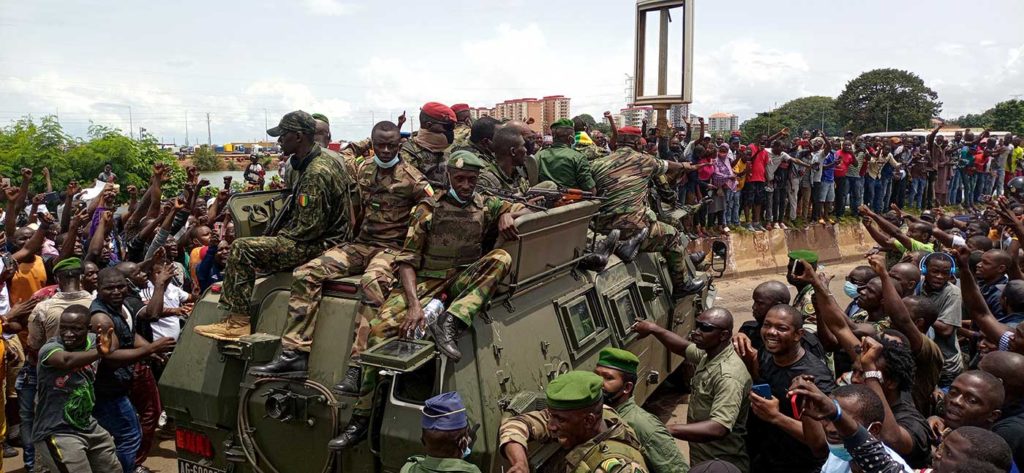
But the joke was on Akufo-Addo when political analysts pointed out that Ouattara had done the same thing in Cote d’Ivoire in August 2020 that Conde had done in Guinea in March 2020. They were implying that Ouattara possessed no moral high ground to intervene in Guinea’s affairs. It is strange that the ECOWAS chairman did not see this point before flying over to Conakry with Ouattara.
Ouattara had announced in March 2020 that he would not run for a third term, because the Ivorian constitution limits presidents to two terms. But his chosen successor, Prime Minister Amadou Coulibaly, died suddenly on August 8. Ouattara then changed his mind, but to run again he needed to make the constitution do a somersault.
Somehow, the Ivorian Constitutional Court ruled in Ouattara’s favor. It held that because Ouatarra served his first term under the previous constitution, it did not count for the purposes of the two-term limit imposed by the current constitution.
This allowed Ouattara to run in the October 2020 election, which was marred by violent protests against his candidacy and boycotted by most of the country’s opposition parties. With turnout only 54.9%, Ouattara won his third term, taking 95.3% of the vote.
What Conde did in Guinea was similar. He had lost previous races for the presidency, in 1993 and 1998, but became third-time lucky in 2010, when he won the second-round runoff vote. He promised to strengthen democracy in Guinea and fight corruption. In 2015, he won re-election with 58% of the vote, even though his promises to strengthen democracy and fight corruption had not materialized.
Conde was not satisfied with the two terms Guinea’s constitution set as the maximum. He manipulated the political situation and called for a constitutional referendum on March 22, 2020 that allowed him to “reset” his term limit and seek two more terms. Enraged Guineans held massive protests before and after the referendum. But Conde brutally repressed the protests and went on to win a third term in the election, held on October 8.
ECOWAS’s hypocrisy
ECOWAS did not say a word against Conde’s changes to the constitution or impose sanctions against him. That gave the impression that if a civilian president decides to become undemocratic, it is fine. But if the military, angry at the mutilation of the constitution, acts to remove the erring civilian president, that becomes anti-democratic and a problem that deserves to have sanctions imposed by ECOWAS.
Akufo-Addo took that position when interviewed by a Ghanaian local radio station in early October.
“So because ECOWAS did not act to stop the third-term mandate of Presidents Ouattara and Conde, we have no right to insist on the unconstitutionality of coups?” he asked. “I am not sure I understand that argument. Okay, it may be the failing of ECOWAS, but going forward, is that the analysis that is going to help the growth of democracy in our region? The Constitutive Text of ECOWAS is about promoting good governance and democratic development in the ECOWAS space. That is the most important thing.”
Akufo-Addo apparently fails to understand that “the growth of democracy” in West Africa or throughout the continent will not be possible if civilian presidents are allowed to violate national constitutions at will and override term limits. What Conde and Ouattara did was effectively as harmful to “the growth of democracy” in the region as military coups are, because they took a large step toward dictatorship while preserving a façade of democracy.
The Ghanaian president, however, seemed to have seen the merit in the above point when he said in his radio interview that perhaps “ECOWAS has to consider including bans on third terms in its Constitutive Text.”
“ECOWAS’s response to the Guinea crisis reflects its legitimacy deficit,” Benjamin Maiangwa, a professor of political science at Lakehead University in Canada, wrote in The Conversation on September 10, five days after the coup. “The organization was conspicuously mute when Conde effectively carried out ‘a coup’ against the Guinean constitution to elongate his term in office. If ECOWAS is to be a champion for good governance, it should address the root causes of political instability and coups. Foremost are the illegitimate measures to extend the terms of incumbents and their abuse of power.”
ECOWAS’s first step, Maiangwa said, should have been to call Conde to order for flouting Article 1(b) of the organization’s 2001 protocol, which states that “‘every accession to power must be made through free, fair and transparent elections.’ The body’s reaction to [Doumbouya’s] coup effectively protects Conde, who manipulated the constitution to prolong his stay in office.”
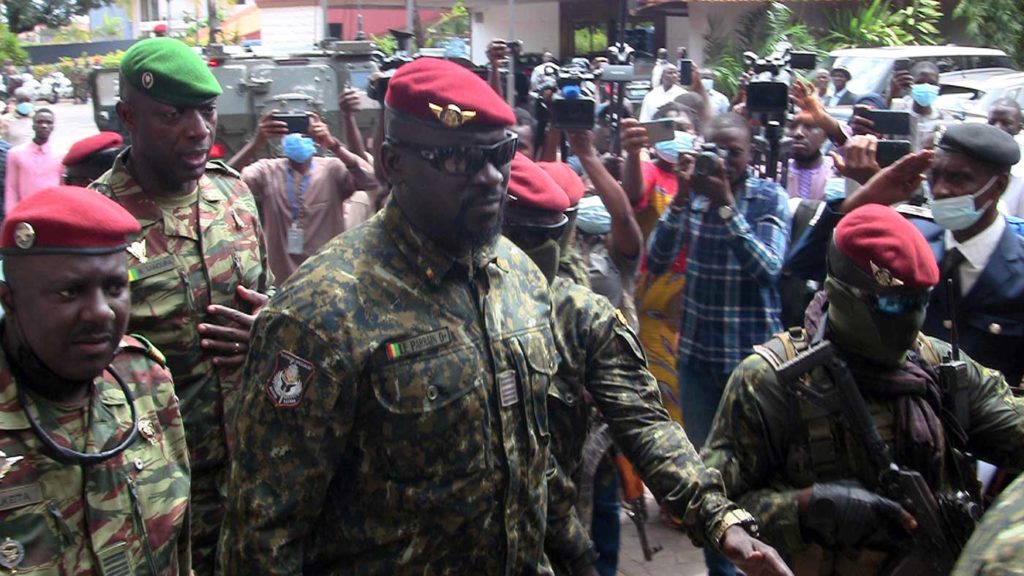
In the past four decades, Africa has seen many instances of civilian presidents changing constitutions to enable themselves to run for three or more terms. Uganda’s Yoweri Museveni, who has twice removed constitutional limits on his ability to seek re-election, won his sixth five-year term in January 2021. Rwanda’s Paul Kagame, now serving his fourth term, pushed through a referendum in 2015 that enables him to run for re-election until 2034. Togo has recently restored two-term limits, but in a way that still enables its current dynastic president to seek re-election.
The effects of this have included authoritarianism and the perpetuation of corruption and institutional impunity – although, to be fair, there are countries that have never allowed their presidents to seek third terms, such as Nigeria and Ghana, where the levels of corruption and the impunity that comes with it have been stunning.
That is the kind of thing that provokes the military to step into politics to stop the rot. Therefore, if democracy is to grow in Africa, such levels of corruption and impunity should be a concern for regional bodies such as ECOWAS, and even the African Union itself.
Corruption was also a key reason for the other coup in Mali, where Colonel Assimi Goita ousted the government of President Ibrahim Boubacar Keita in August 2020. Goita, 38, and Doumbouya, 41, are the youngest and second-youngest presidents in Africa.
Making matters worse in Guinea is the fact that the country has vast mineral wealth, including the world’s largest reserves of bauxite, the ore used to produce aluminum. On the day of Doumbouya’s coup, aluminum prices shot through the roof on world markets. But the nation of 13 million people is still one of the poorest countries in the world, and that provokes extremes of anger in the people and soldiers alike.
A gentle giant?
Mamady Doumbouya’s rise to the top has been phenomenal, considering that he only returned to Guinea from the diaspora in 2018. Like Conde, he is a Malinké from the eastern Kankan region. With his height, size, and military bearing, he cuts an imposing figure.
He had spent much of the previous 15 years in France. He is married to a French woman, a former gendarme, who has borne him three children.
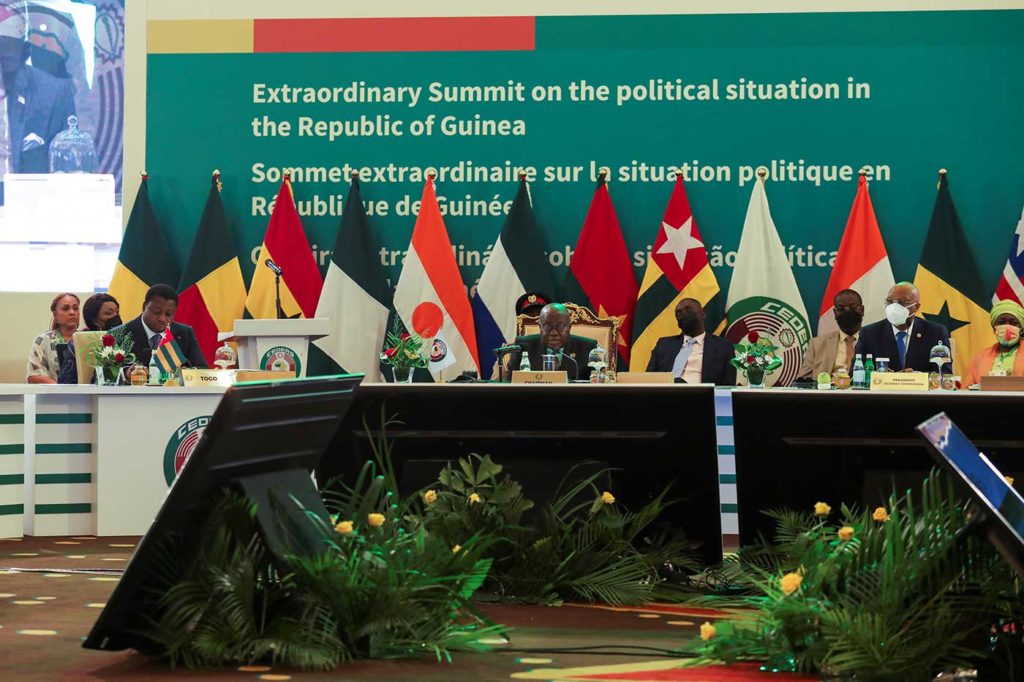
Doumbouya trained at the École de Guerre in Paris, acquired French citizenship, and became a member of the French Legion, which sent him on missions to hot spots such as Djibouti, Afghanistan, Cote d’Ivoire, and Central African Republic. He also served in Israel, Cyprus, and Britain.
Reports say he “brilliantly completed an operational protection specialist training at the International Security Academy in Israel, as well as elite military training in Senegal, Gabon, and France.”
He holds a master’s degree in defense and industrial dynamics from the Université Paris 2 Panthéon-Assas, France’s premier research university specializing in law and economics.
It is said that Doumbouya’s excellent performance in the French army impressed President Conde, who asked him to return home. On his arrival in 2018, Doumbouya struck it lucky when Conde liked and trusted him enough to make him the head of the newly created Special Forces (Groupement des Forces Spéciales), an elite unit that was financed by the presidency and had better equipment and training than Guinea’s regular army.
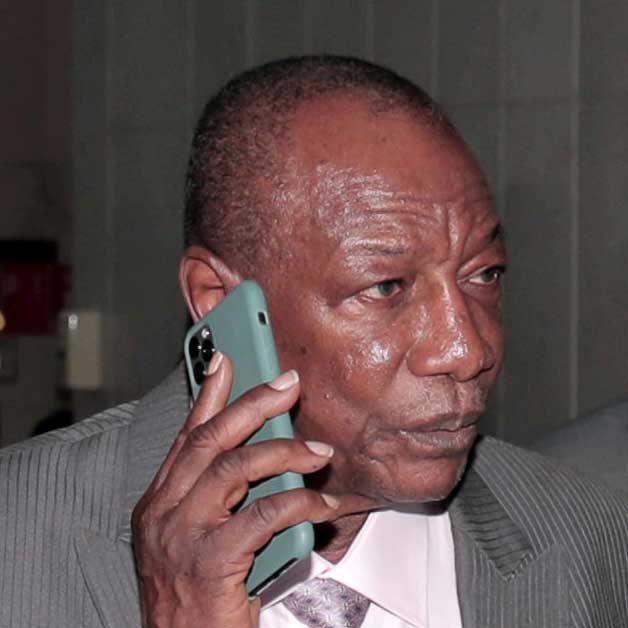
The Special Forces soon grew from 200 to 500 members, and as more and better equipment and training came their way, Doumbouya became more powerful. Part of that training came from the Americans.
“The United States provides countries like Guinea with security assistance and weapons in order to improve the competence and professionalism of their militaries,” A. Trevor Thrall and Jordan Cohen of the Cato Institute, a Washington-based libertarian policy group, wrote in mid-September. “The hope is that this will help stabilize the government and, in many cases, help the government confront insurgencies or terrorist groups.”
Over the last decade, they said, the U.S. authorized $4.8 million in weapons sales to Guinea, provided $9.06 million in security assistance, and trained 1,326 soldiers there. Most of the training was for peacekeeping operations, and the rest focused on combatting terrorism and general military education.
Doumbouya and his Special Forces were a major beneficiary of this American training. Some of it happened in Burkina Faso, where Doumbouya is said to have trained with Colonel Assimi Goita, the future Malian coup leader.
“Though far from the only coup initiated by forces with American training, this coup marks the first time that someone has led a coup while taking that training,” Thrall and Cohen wrote – although, they added, American officials have tried to distance the United States from the coup by saying that it is “inconsistent with U.S. military training and education” and suspending military support to Guinea.
The two Cato writers contended that academic research shows that “military coups are more common and more successful after the military receives external support. Military aid and training shift the balance of human capital away from the country’s government and towards their military. As a result, the military becomes competent enough to overwhelm other, weaker institutions of the country.”
People’s reaction
Doumbouya’s coup was greeted with wild jubilation in Conakry and Guinea’s other major urban centers, as thousands of euphoric people took to the streets to celebrate the ouster of what they considered an oppressive regime.
Professor Maiangwa, in his article in The Conversation, said the coup was “only a reflection of the unstable political climate that Guinea has had since independence in 1958,” as the “chaotic sociopolitical and economic conditions that transpired prior to Conde’s presidency are quite similar to the chaos of his regime which led to his ouster.”
He wrote that the overthrow of Conde’s government was “premised on its violation of citizens’ rights, disregard for democratic norms, politicization of the public service, endemic political corruption and poverty.” Doumbouya said “it was the duty of the soldier to save the country” from one-man rule.
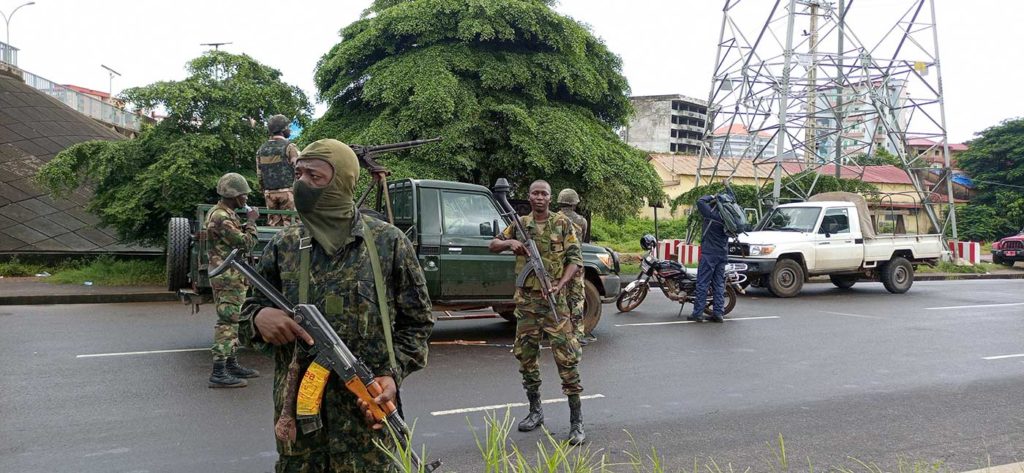
Other people think Doumbouya’s coup was possible because “the world turned a blind eye to Conde’s abuses.” Jeffrey Smith, founding director of the pro-democracy nonprofit organization Vanguard Africa, and Jonathan Moakes, a director of the international strategic communications firm SABI Strategy Group, writing for the U.S. journal Foreign Policy, maintained that “the coup was both foreseeable and preventable – and steps can be taken to prevent similar crises in the future.”
The ouster of Conde, they said, was at its core “the inevitable outcome of his autocratic overreach and eroding democratic norms in Guinea, which included brazenly amending the constitution to allow him to run for a third term (in the process, firing anyone who attempted to stand in his way, including the head of the country’s Constitutional Court in September 2018). The ensuing protests were met by state violence and the loss of civilian life, as the Guinean military repeatedly clashed with peaceful demonstrators on the streets.”
Smith and Moakes blame both the African Union and ECOWAS for declaring the 2020 election in Guinea as free and fair, “while the protests and valid grievances of the Guinean people registered barely a mention in the international press. The world casually went on with its business, secure in the apparent long-term stability, and continued access to the country’s vast mineral reserves, that a third Conde term would deliver.”
According to the two writers, “a more active policy could also have created diplomatic engagement to lay down clear red lines to counter the nefarious role of Russia, Conde’s biggest international backer. In line with African Union and ECOWAS guidelines, that might have meant a rejection of the October 2020 election result and calls for a rerun. At the very least, it would have produced targeted sanctions on Conde, his inner circle, and his family members.”
If the international community had “taken note of the express wishes of the Guinean people, who have overwhelmingly and consistently supported presidential term limits and worked to protect democracy, active observer missions could have been deployed with a clear mandate to call out electoral irregularities and the vote rigging that ultimately took place,” they continued.
But that did not happen. “Instead, what Guinean citizens received were hollow, often farcical statements calling for peace and stability,” Smith and Moakes said. “They saw the results of a patently rigged election legitimized, as well as what many perceived to be a wholly illegitimate government shored up by repression and violence. They bore personal witness to an international community willing to ignore evidence of a continued assault on basic freedoms and a worsening economic outlook.
“No wonder, then, that Guineans have been quick to embrace their new leaders, albeit those clad in military fatigues, instead of placing their hopes in regional and international communities whose leaders often espouse democratic principles but rarely stand up to help defend them.”
The future
Judging from what has happened since the coup, whatever ECOWAS and the African Union would say or do, Doumbouya and his CNRD are determined to hang on to power as long as possible in the transitional period, and to do whatever they think is right and in the national interest before they pass the baton back to civilians.
ECOWAS has given Doumbouya and the CNRD six months to return Guinea to constitutional order, but it is clear that deadline cannot be met. Doumbouya and his ruling colleagues have to write a new constitution and set up an electoral commission, while the political parties would have to organize themselves and mount election campaigns.
But to appease ECOWAS, the international community, and more specifically, Guineans themselves, the transitional charter that Doumbouya and the CNRD adopted on September 27 clearly states that no member of the CNRD or those of the Conseil National de Transition (National Transition Council) will be able to run for president in the next election.
Doumbouya has since appointed former diplomat Mohamed Beavogui as prime minister of the transitional government. Beavogui, who once served as UN assistant-secretary general, has been given the responsibility of organizing local, legislative, and presidential elections.
A graduate of the Harvard Kennedy School in the U.S. and Leningrad Polytechnic University in Russia, Beavogui, 68, has done stints working with the UN agencies Food and Agricultural Organization, International Fund for Agricultural Development, and the United Nations Office for Project Services.
His age and long experience as an international civil servant are expected to put him in good stead in a transitional government full of people far younger than him and with much less local and international experience.
At the moment, the eyes of Africa and the world are fixated on Doumbouya and the CNRD. They would do well not to disappoint.